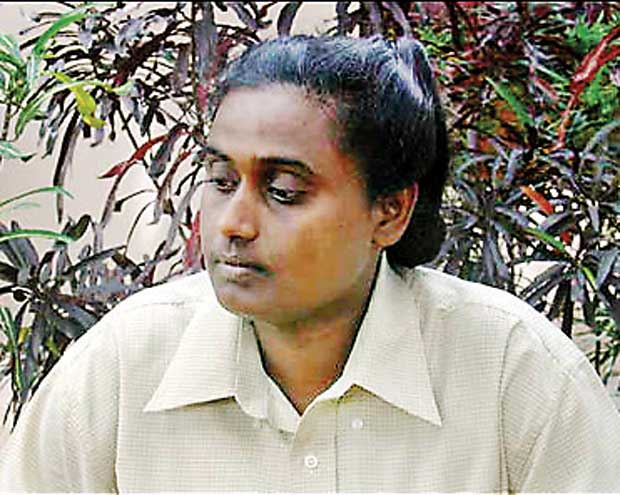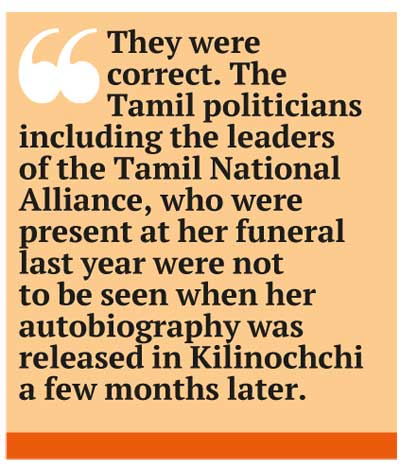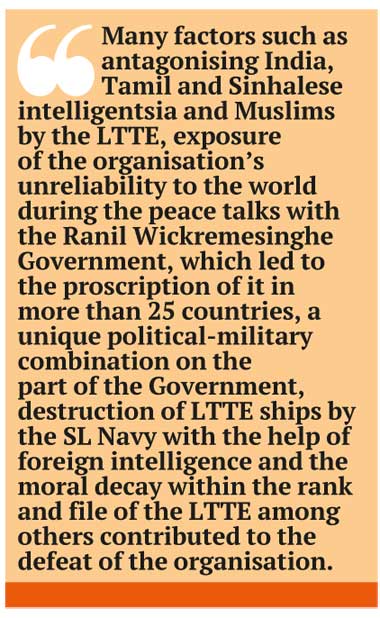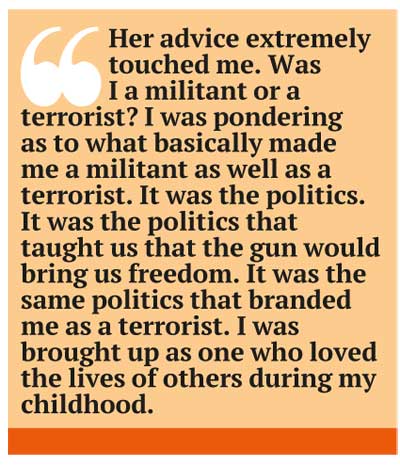Reply To:
Name - Reply Comment
Last Updated : 2024-04-17 02:11:00

 he defeat in 2009 of the Liberation Tigers of Tamil Eelam (LTTE) which had overrun many huge military bases in the north and the east for over two decades would definitely have puzzled many in Sri Lanka as well as in other countries.
he defeat in 2009 of the Liberation Tigers of Tamil Eelam (LTTE) which had overrun many huge military bases in the north and the east for over two decades would definitely have puzzled many in Sri Lanka as well as in other countries.
It was an organisation that had overrun the Elephant Pass Army camp complex killing the majority of its 11,000 soldiers in April 2001.
Only around 250 out of around 1,500 soldiers were able to escape when the LTTE launched a surprise attack on the isolated but heavily fortified Mullaithivu Army Camp in June 1996.
It rolled back the 18 month long military operation, the Operation Jayasikuru involving more than 30,000 soldiers in 1998.
What then really happened to the world’s only guerilla movement that had all three military branches, the Army, the Navy and an ‘Air Force?
This was the question Subramaniuim Sivakami alias Thamilini, the women’s political wing leader of the LTTE had attempted to answer in her 268 page autobiography.
One of the outfit’s strong critics and former EPDP Parliamentarian Nadaraja Ramesh, who was assassinated by still unidentified gunmen in the late 1990s once in the heyday of the LTTE wrote in Thinamurasu, the then highly popular Tamil weekly, he was editing that it would be difficult for one to attribute the successes of the LTTE, if he or she tried to paint every action of the organisation in black.
The essence of Thamilini’s book contends on the other way around-if everything was rosy on the part of the LTTE one would not be able to explain its defeat.
She had put this point in the very preface of the book.
“I have questioned myself as to why I should write this. Only one answer has been pushing me to write. I must tell a truth that is still stuck in my throat to the people, whom I love as I love my very soul. Our struggle which was conceived in order to win the political aspiration of a race had been built on the sacrifices of hundreds of thousands of lives. What then ended it up in zero? This is the  question that is being posed by the world that was shaken by
question that is being posed by the world that was shaken by
that defeat.”
Hence, it is natural for her autobiography to become critical of major decisions by Velupillai Prabhakaran, the leader of her organisation and earn the wrath of those who blindly love that leadership.
However, even while criticising her leader for his decisions and attitudes that had led to the loss of thousands of lives of her colleagues as well as ordinary people and to the immense hardships that the people had to face, she had not lost her affection and respect to him.
Thamilini and her husband Mahadevan Jeyakumaran had expected the repercussion of her criticism of the LTTE leadership to be highly unwelcome.
Jeyakumaran in his preface to the book says “I gave her the assurance that even if she was banished from the community after being criticised for telling the truth, I would be prepared to share that punishment.”
They were correct. The Tamil politicians including the leaders of the Tamil National Alliance, who were present at her funeral last year were not to be seen when her autobiography was released in Kilinochchi a few months later.
Although it was called an autobiography the book mainly covers her life in the LTTE, only with a very brief reference to her childhood.
Having acted as a propagandist of the organisation for over 16 years, Thamilini seems, through her  book, to have had a very strong language command with an eloquent flow in expressing herself.
book, to have had a very strong language command with an eloquent flow in expressing herself.
Many factors such as antagonising India, Tamil and Sinhalese intelligentsia and Muslims by the LTTE, exposure of the organisation’s unreliability to the world during the peace talks with the Ranil Wickremesinghe Government, which led to the proscription of it in more than 25 countries, a unique political-military combination on the part of the Government, destruction of LTTE ships by the SL Navy with the help of foreign intelligence and the moral decay within the rank and file of the LTTE among others contributed to the defeat of the organisation.
Many of these situations had been created as a result of the peace talks and the ceasefire. However, Thamilini had dealt only with one of these aspects, the moral decay, in her book that contributed to her organisation’s downfall.
She mainly criticises her leader for his decision to conscript young Tamil boys and girls as rebels and sending them to the battlefront without proper training.
She says that there was a time during the last phase of the war when the organisation had stooped to the level of satisfying itself with the ability of a person to just pull the trigger of a gun before he was sent to the battlefront
“My stand is that the most important among the worst decisions taken by leader Prabhakaran was the one to conscript youth by force,” she says and adds in another page
 “When the organisation arrived at the decision to conscript in order to increase the man power, people began to see another devilish face of
“When the organisation arrived at the decision to conscript in order to increase the man power, people began to see another devilish face of
the organisation.”
In many places in the book she had compared the plight of the people, who had been trapped in the horrific effects of the war with the professed aim of the struggle and questions herself as to whether the people deserve the plight. When explaining the situation after the security forces recaptured Kilinochchi, the administrative capital of the LTTE in January 2009, she says:
“I was extremely distressed by the plight and the deaths of the people that had been unfolding before our own eyes. The blood of the people in whose name we set out to fight had been flowing like a river. I could not appease my mind with any of the justifications of the war we had been engaging in. I in fact hated the armed struggle in that situation.”
Thamilini’s writing skill is clearly manifested in her reading of her own self in so many places of the book.
“I felt as if a sense of prestige and arrogance creeping into me when I first wore the LTTE’s striped military uniform and the shoes” She had told. It seems to be a very honest self criticism.
On the day Prabhakaran’s body was found on the bank of the Nandikadal lagoon, Thamilini was in the custody of the Army with whom some Tamil youth had been collaborating in identifying the frontline Tigers.
She says “A Tamil youth brought the day’s newspapers and showed us some pictures in it. They were the pictures of the leader who had then been killed.
“Your leader has died, all cry,” he shouted while crying mockingly. A sudden noise that rose from among the detainees subsided immediately and abruptly.
It is extremely difficult to explain the situation where we tried to pretend that we did not hear what we heard about the death of the man, whom every militant had firmly enshrined in his or her heart as a  respected brother, a loving father and the god present before his or her own eyes and whose words were taken as a divine command and followed.”
respected brother, a loving father and the god present before his or her own eyes and whose words were taken as a divine command and followed.”
Thamilini explains an incident where she had been sent for a medical checkup carried out by a young judicial medical officer while she was in the custody of the CID in Colombo.
“The young lady doctor told me in broken Tamil ‘killing life is a sin. This world is very beautiful. Why have you been a terrorist for so long? Learn to love the lives in future.”
“Her advice extremely touched me. Was I a militant or a terrorist? I was pondering as to what basically made me a militant as well as a terrorist. It was the politics. It was the politics that taught us that the gun would bring us freedom. It was the same politics that branded me as a terrorist. I was brought up as one who loved the lives of others during my childhood. It was the belief that I would be able to protect the future of the people that pushed me into the struggle. But I have been responsible for the deaths and destructions carried out in the name of freedom. It is a treachery against my conscience to deny or conceal it.”
Thamilini’s narration about these three incidents points as to how serious and vivid she was when she reads her own self.
One might say that the autobiography of the women’s political wing leader of the LTTE was one-sided. As a rehabilitated former LTTE cadre, she might have had restrictions for the book to be one-sided. But that wouldn’t prevent one from accepting the facts explained in the book as facts. It might be a clear picture of one of the two sides. Besides, the once mighty LTTE had been decimated. As Thamilini says it wouldn’t have happened had everything on the part of the outfit been perfect. It is definitely food for thought.
Gangadeva Saturday, 03 September 2016 09:25 PM
Good article to read !

Add comment
Comments will be edited (grammar, spelling and slang) and authorized at the discretion of Daily Mirror online. The website also has the right not to publish selected comments.
Reply To:
Name - Reply Comment
On March 26, a couple arriving from Thailand was arrested with 88 live animal
According to villagers from Naula-Moragolla out of 105 families 80 can afford
Is the situation in Sri Lanka so grim that locals harbour hope that they coul
A recent post on social media revealed that three purple-faced langurs near t